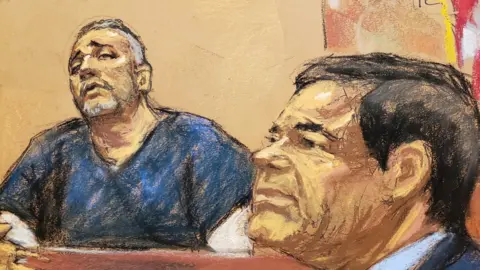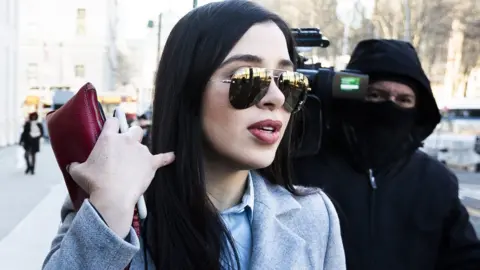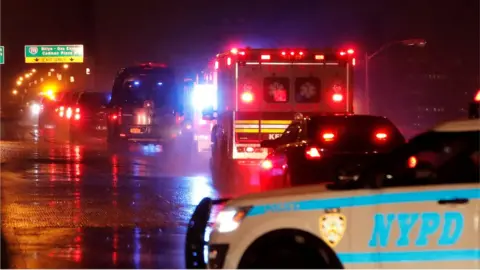El Chapo trial: Mexican drug lord Joaquín Guzmán found guilty
Mexican drug kingpin Joaquín "El Chapo" Guzmán has been found guilty on all 10 counts at his drug-trafficking trial at a federal court in New York.
Guzmán, 61, was convicted on numerous counts including the distribution of cocaine and heroin, illegal firearms possession and money laundering.
He has yet to be sentenced, but the verdict could mean life in jail.
Guzmán was arrested in January 2016 after escaping from a Mexican prison through a tunnel five months earlier.
He was extradited to the US in 2017.
The Mexican was accused of being behind the all-powerful Sinaloa drug cartel, which prosecutors say was the biggest supplier of drugs to the US.
What happened in court?
Tuesday's unanimous verdict by a jury in Brooklyn, which was read out in a packed courtroom, followed an 11-week trial.
Guzmán, wearing a dark suit jacket and tie, showed no visible sign of emotion as the verdict was announced, CBS News reported.
As he was escorted from the courtroom, Guzmán shook the hands of his lawyers before exchanging glances with his wife, Emma Coronel, a 29-year-old former beauty queen, and giving her the thumbs up.
Judge Brian Cogan, who presided over the trial, thanked the jurors for their dedication at what he described as a complex trial, saying it was "remarkable and it made me very proud to be an American".
Guzmán's lawyers said they planned to launch an appeal.
Who is El Chapo?
"El Chapo" (or "Shorty") ran the Sinaloa cartel in northern Mexico.
Over time, it became one of the biggest traffickers of drugs to the US. In 2009, Guzmán entered Forbes' list of the world's richest men at number 701, with an estimated worth of $1bn (£775m).
He was accused of having helped export hundreds of tonnes of cocaine into the US and of conspiring to manufacture and distribute heroin, methamphetamine and marijuana.
He was also said to have used hitmen to carry out "hundreds" of murders, assaults, kidnappings and acts of torture on rivals.
Key associates, including one former lieutenant, testified against Guzmán.
What was heard during the trial?
It provided shocking revelations about the Mexican drug lord's life.
Court papers accused him of having girls as young as 13 drugged before raping them.
Guzmán "called the youngest of the girls his 'vitamins' because he believed that sexual activity with young girls gave him 'life'", a former associate, Colombian drug trafficker Alex Cifuentes, was quoted as saying.
During the trial Cifuentes also alleged that Guzmán gave a $100m (£77m) bribe to former Mexican President Enrique Peña Nieto, who is said to have contacted him after taking office in 2012 and asked for $250m in return for ending a manhunt for him. Mr Peña Nieto has not publicly commented.
 Reuters
ReutersAnother witness described seeing Guzmán murder at least three men.
Former bodyguard Isaias Valdez Rios said Guzmán beat two people who had joined a rival cartel until they were "completely like rag dolls". He then shot them in the head and ordered their bodies be thrown on a fire.
In another incident, he had a member of the rival Arellano Felix cartel burned and imprisoned before taking him to a graveyard, shooting him and having him buried alive.
Guzmán is also alleged to have had his own cousin killed for lying about being out of town, and ordered a hit on the brother of another cartel leader because he did not shake his hand.
When asked by a former cartel lieutenant why he killed people, he is alleged to have said: "Either your mom's going to cry or their mom's going to cry."
 EPA
EPAThe court heard details of his 2015 escape from Mexico's maximum-security Altiplano prison. His sons bought a property near the prison and a GPS watch smuggled into the prison gave diggers his exact location.
At one point Guzmán complained that he could hear the digging from his cell. He escaped by riding a specially adapted small motorcycle through the tunnel.
He also used software on his phone to spy on his wife and mistresses, which allowed the FBI to present his text messages in court.
In one set of texts, he recounted to his wife how he had fled a villa during a raid by US and Mexican officials, before asking her to bring him new clothes, shoes and black moustache dye.
Why was this trial significant?
Guzmán is the highest profile Mexican drug cartel boss so far to stand trial in the US.
The drug war in Mexico - pitting the Mexican and US authorities against cartels smuggling drugs into the US and the cartels against each other - has killed about 100,000 people over more than a decade.
Guzmán achieved notoriety for twice escaping custody in Mexico as well as avoiding arrest on numerous other occasions.
Among some in his home state, he had the status of a folk hero, a popular subject of "narcocorridos" - musical tributes to drugs barons.
In 2016, he gave an interview to Hollywood actor Sean Penn in a Mexican jungle following his escape the previous year and boasted that he was the world's leading supplier of heroin, methamphetamine, cocaine and marijuana.
He was later recaptured in the north-western town of Los Mochis. During the raid he fled through a drain but was later caught by troops in a shootout.
 Reuters
ReutersThe US indictment against him was a consolidation of charges from six federal jurisdictions across the country, including New York, Chicago and Miami.
Prosecutors pooled together evidence acquired over more than a decade, including from international partners such as Mexico and Colombia, to build their sweeping case.
The trial jurors were anonymous and were escorted to and from the courthouse in Brooklyn by armed marshals after prosecutors argued that Guzmán had a history of intimidating witnesses and even ordering their murders.
